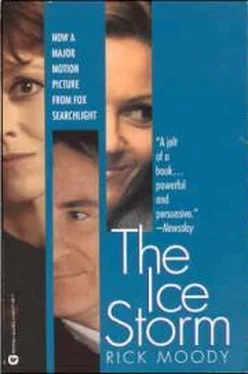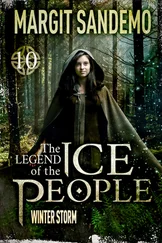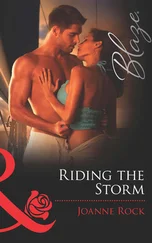Rick Moody - The Ice Storm
Здесь есть возможность читать онлайн «Rick Moody - The Ice Storm» весь текст электронной книги совершенно бесплатно (целиком полную версию без сокращений). В некоторых случаях можно слушать аудио, скачать через торрент в формате fb2 и присутствует краткое содержание. Город: New York, Год выпуска: 1997, ISBN: 1997, Издательство: Warner Books, Жанр: Современная проза, на английском языке. Описание произведения, (предисловие) а так же отзывы посетителей доступны на портале библиотеки ЛибКат.
- Название:The Ice Storm
- Автор:
- Издательство:Warner Books
- Жанр:
- Год:1997
- Город:New York
- ISBN:0-446-67148-7
- Рейтинг книги:4 / 5. Голосов: 1
-
Избранное:Добавить в избранное
- Отзывы:
-
Ваша оценка:
- 80
- 1
- 2
- 3
- 4
- 5
The Ice Storm: краткое содержание, описание и аннотация
Предлагаем к чтению аннотацию, описание, краткое содержание или предисловие (зависит от того, что написал сам автор книги «The Ice Storm»). Если вы не нашли необходимую информацию о книге — напишите в комментариях, мы постараемся отыскать её.
The Ice Storm — читать онлайн бесплатно полную книгу (весь текст) целиком
Ниже представлен текст книги, разбитый по страницам. Система сохранения места последней прочитанной страницы, позволяет с удобством читать онлайн бесплатно книгу «The Ice Storm», без необходимости каждый раз заново искать на чём Вы остановились. Поставьте закладку, и сможете в любой момент перейти на страницу, на которой закончили чтение.
Интервал:
Закладка:
The huffing sobs coming from her daughter like a backward language. Elena heard her mother’s cries, heard the ghost of her own mother, and she saw her own place in the ladder of madness and desolation. She felt that she, too, would be locked away, locked into Silver Meadow and visited only on weekends. The two of them encircled their daughter.
— Oh, baby doll, Benjamin said. What the hell. Oh, lord.
Hood saw, with horror, the familiar garter belt.
— It’s okay, darling, Elena said to Wendy. And then to her husband: — It’s okay, it’s just a scratch. This isn’t too bad. It’ll close up fine. It’s not a…
Elena held Wendy’s doll body close, and then, reciting incantations known only to mothers, she unhooked the garter belt, the way some teenaged smoothy could undo a complicated support bra backwards in the dark. She fastened up Wendy’s pants and set the crusty garment aside.
— Are you sure? Benjamin said. What about tetanus? Shouldn’t we…
— Wendy, Elena said. What did you use to do this? Wendy mumbled:
— Wilkinson double-bonded…
— A new one? A new blade? Wendy nodded.
— Take better care of those things, Elena said to her husband. Lock them away. And where did you get that… that lingerie?
— Williamses’, Wendy said.
She sank to the floor, wilted, and her two parents sat down with her, on the damp, fungal carpet. The garter belt lay aside like some strangely essential family gear. Elena knew all about the rococo ornamentation of grief and so she didn’t try to comfort Wendy. Not right away. No hug was going to do the trick now. But Benjamin tried the laying on of hands. Where he had been penurious as a dad before, he suddenly recognized necessity. He wrapped his arms around his daughter. And Elena wasn’t impervious to the sight of it. She wasn’t impervious to the way embraces were a sort of cardiology. So Wendy lay in her father’s arms, asking what happened, what happened to Mike, where was he now, refusing, so far, to be the bearer of his memory. Refusing, therefore, to let him journey away. All these losses were sutured up in Wendy now, like when she and Paul found Benjamin’s father in the basement one weekend, when they heard his oddly practical voice calling out to them, I’ve lost the use of my legs. That stroke weekend. Like when Elena’s father had died in the spring. All Wendy’s losses were one. And so were Elena’s, and Benjamin’s, and Janey’s, and Jim’s, and…
— Darling, Elena said. Did Paul happen to call last night?
Between hyperventilating gasps:
— Said he was going to take the last train.
— Trains won’t be running, Benjamin mumbled. Can’t be.
— Maybe we should drive out to the station anyway, Elena said. Let’s just go take a look.
— You don’t think you should stay here? With her? What if they…. What if the telephones start working? I could go…
— No, I’d rather…. If there’s going to be any trouble. I’d rather.
And then Elena smiled:
— It’s got a heater, too. The car.
— Would that be okay? Ben said to Wendy, quietly. Do you think you could come with your mother and me while we drive down there? I’d rather you came with us, sweetheart.
It was almost noon when Benjamin got back with the Firebird. They packed Wendy in, her wrists sleeved in a Handi Wipes, that rag from the convenient plastic container. She had a glass of Tang with her. And a space blanket. The dog was huddled in the back seat. Up against her.
The temperature had dipped again. The unrestrained sun of the morning was gone. They headed down past the Silvermine Arts Guild and the Silvermine Tavern, where a cereal commercial had recently been filmed, and in doing so, they traveled across the latitudes of ancestral New Canaan. Here John Gruelle had first drawn his famous Raggedy Ann; landscape artist D. Putnam Bradley had painted his sweet pastorals; here Hamilton Hamilton had pen-and-inked, and Childe Hassam had gallicized a little verdant scene. Among writers Padraic Colum, Irish-born poet and folklorist, and Robert Flaherty, Arctic explorer, lived here, and William Rose Benet and Maxwell E. Perkins. Perkins, maybe, while editing Look Homeward, Angel: “ We had a grand winter at New Canaan. Skating on most of the week-ends and hockey, and over New Year’s, for three windless days, the whole three-mile lake, a sheet of flexible black ice.”
Over this history they drove, over decomposing Canaan Parish. Before long the Hoods would move. Half of the family would move and the other remain. Maybe in the years that followed, they would spend their weekends, like the Williamses, arranging the complexities of visitation. Benjamin Hood would drop his daughter off or find his daughter waiting in the driveway of her mother’s house, in Wilton or Westport or East Haven or Darien. He would see his wife through the rustle of drapery. Benjamin Hood would leave his daughter alone for the afternoon at R-rated films, or he would go with her, exhausted, to the Red Coach Grill or McDonaldland. And Elena would be doing a telemarketing job offering subscriptions to Club, or she would have a photocopying job, and she would be secretly dating. Like Benjamin. But they wouldn’t be dating the Williamses.
At the train station in New Canaan, that little end-of-the-line train station, they were told that the 11:10 had never made it to Stamford. It had been disabled somewhere around Greenwich.
The three Hoods crowded around the ticket window. Three blossoms on a thorny stem. They barked questions.
— Good news is, said the man at the window, they restored the power not long ago. On the New Haven line. The trains are running now. Probably your boy is in Stamford right now. Catching a taxi.
— If he has any money, Benjamin said.
The two men tried to force a laugh.
So they set off for Stamford, driving slowly. In the midst of all this personal trouble, what did a little history matter? What difference did snapshots make, or bronzed shoes? Who cared about those plastic cubes full of snapshots? History was cheap trophies and misspelled school newspapers, and it was also the end of town meetings in 1969, and it was also the guy in New Canaan who remained a voluntary slave for years after the Emancipation Proclamation, and it was the driving off of the Sagamores in the seventeenth century, and the pristine quiet of the region before the first English settlers. History’s surveillance was subtle and enduring and its circular shape caught the Hoods, the Nixons, and everyone else. You could pay Arthur Janov to teach you to scream about history, or you could learn prayer or a mantra, or you could write your life down and hope to make peace with it, write it down, or paint it, or turn it into improvisational theater, but that was the best you could probably do. You were stuck.
FUCKING FAMILY. Feeble and forlorn and floundering and foolish and frustrating and functional and sad, sad. Fucking family. Fiend or foe. Next month: the end of the Fantastic Four. The Fab Four. The Fetishistic Four. Family was all tricks with mirrors. Flimflam. Back through the generations, back forefathers and forefathers and forefathers, it was a mantle he didn’t think he could hold up. All flummery. Paul Hood, the flame, the torch, burnt out. Burnt at both ends. He wished he could forget them, wished he could put this trip behind him, wished he was still eating with a bib, making models of stock cars, four on the floor, wished he was back in the arms of some girl. Missed Libbets. On the platform in Stamford. He wanted to run, to flee fathers, forefathers, fornification, femmes fatales, and all that stuff. He wanted to flee friends.
The night had been really, really long. Hours scribbling pictures on a scrap of newspaper he had found under the seat, hours frigid in the dark, really long that night, so long that he was starting to believe the dumb lies he’d told. Starting to believe dumb, little stories about his family. Believing in familiar comforts. Scribbling pictures and writing crumbling sentences. Free-verse trash and quotations from Thick as a Brick. Practically hallucinating. He actually believed his family would be waiting for him when he got in. They would be waiting there — while the rapist on the train hotfooted it back to his leopard skin-blanketed, water-bedded crash pad — and they would be terribly concerned and they would hug him and they would think up new nicknames for him and they would drive him directly to the largest possible bowl of shrimp cocktail.
Читать дальшеИнтервал:
Закладка:
Похожие книги на «The Ice Storm»
Представляем Вашему вниманию похожие книги на «The Ice Storm» списком для выбора. Мы отобрали схожую по названию и смыслу литературу в надежде предоставить читателям больше вариантов отыскать новые, интересные, ещё непрочитанные произведения.
Обсуждение, отзывы о книге «The Ice Storm» и просто собственные мнения читателей. Оставьте ваши комментарии, напишите, что Вы думаете о произведении, его смысле или главных героях. Укажите что конкретно понравилось, а что нет, и почему Вы так считаете.












